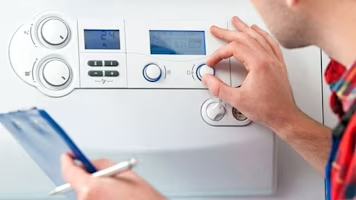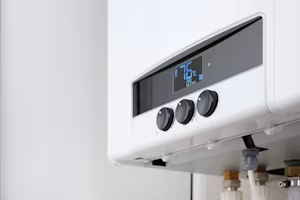
Get up to 50% off on your boiler cover with OVO
Pay from £11.05 a month for peace of mind^
24/7 emergency helpline
Dedicated expert support
Unlimited call outs
Annual boiler service included
Offer only available on the £0 and £60 excess boiler cover. New customers only. 12 month contract. Terms, eligibility, cancellation charges and 30 day exclusion applies. Offer ends 26 February 2026.

What is boiler cover?
Boiler cover is essentially boiler insurance: it's a policy you can take out to cover your boiler in the event it breaks down. It can give you peace of mind that if your boiler does break down, a gas safe registered engineer will assess and try to fix the problem.
Some policies also include boiler servicing, meaning an engineer will annually service your boiler to ensure it’s in good working order.
A boiler cover policy can also help with:
Central heating repairs
Plumbing and drainage repairs
Electrical wiring
Pests in your home
Home emergencies
Boiler replacement

How does boiler cover work?
You’ll be covered for boiler repairs, which generally includes labour and spare parts, as well as any extras included in the policy. In most cases you'll also have access to an emergency helpline to get problems solved quickly. However depending on your policy, the cover may work in different ways:
There may be a limit on how long the engineer can spend on repairs
You may need to pay an excess on call outs, depending on how much you’re willing to pay each month
You may also be restricted on how many claims you can make a year
There may be a waiting period after you take your policy out during which you won’t be able to claim
Your boiler might not be covered if it’s too old or can’t be economically repaired
Do I need boiler cover?
Boiler cover is sometimes included as part of home insurance. So it’s well worth checking to see if you already have cover in place before taking out another policy. If you’re renting, boiler insurance should ultimately be your landlord’s responsibility, though you may be able to take out your own policy if your landlord gives you permission.
It’s always a good idea to have boiler cover in place as soon as possible, as many providers impose waiting periods that prevent you from claiming at the start of the policy. This is to discourage people from only taking out cover during an emergency. So unless you’re willing to risk being left without heating or hot water, we’d recommend you sign up for cover at the earliest opportunity.
Boiler cover products
Types of boiler cover products available:

Should I get boiler cover?
Getting boiler cover is a no brainer, especially with a wide range of products available to suit all needs and budgets. For a small outlay you can get peace of mind, knowing that if your boiler breaks down you’ll have swift access to an engineer. In most cases, your policy also includes an annual service, meaning your boiler should run in the best condition throughout the year.
The good news is that you can add heating cover, plumbing and even electrical breakdown and home emergency cover, meaning you’ll have extensive protection throughout the home.

Our expert says…

Skipping your boiler service can cost you much more in the long run
A fifth of households are not getting an annual boiler service, and a third (31.4%) of those households said that cost was the main reason for it. But skipping a boiler service is far from the best way to save money.
The average cost of a one-off boiler service is around £100. According to Checkatrade, the average cost of a new boiler is around £1,500 and the cost of installation can add another £1,000 to your bill.
Worse - not servicing your boiler can also put you at risk of invalidating your insurance.
Ashton Berkhauer Home & Utilities Expert
Trusted Service Awards Winners
MoneySuperMarket has won the Feefo Platinum Trusted Service Award, an independent seal of excellence, which recognises businesses that consistently deliver a world-class customer experience.

How to keep your boiler healthy
There are a few key things you can yourself to ensure that your boiler stays healthy. These include:
An annual boiler service - a service is usually included within boiler cover and is essential if you want your boiler to work to its full potential and to stave off any issues. Services are best carried out in summer, in order to minimise the risk of issues in winter.
Bleed radiators - if radiators feel cold to the touch even when the heating is on, you may need to bleed them. This is a simple process that requires something to catch water in and plenty of patience. The result will be a warmer home and a boiler that isn’t working too hard.
Dust around your boiler - this may seem simple, but dust can get inside your boiler and cause issues. Clean around the outside of the boiler when you dust your home. Never attempt to clean the inside, always turn to a professional for this task.
Check pressure - if your pressure is low, then your boiler won’t work properly. Set it correctly using the switch which is usually found beneath the main controls. Search for your specific model online if you’re not sure how to do it.
Turn on your heating in summer - this may seem counterintuitive, but firing up your boiler in summer is a great way to find any issues before the weather gets cold.

More expert boiler guidance
What is boiler cover?
Boiler cover is a type of insurance you can take out as protection if something goes wrong with your boiler and/or central heating. It can help cover the costs of engineer call-outs and labour costs as well as any parts they may need to make the required repairs.
Who needs boiler cover?
If you own your own home, you should have some sort of cover for your heating system - Although you should first check that your boiler is not included in your home insurance, as some policies do offer this.
If you rent your home, you do not need any central heating cover - this is for your landlord to organise. However, you should discuss the terms of their landlord boiler protection policy with them when moving in, just in case you have to use it during your tenancy.
What types of boiler cover are there?
There are two main types of cover available; boiler breakdown cover and full central heating cover. Boiler cover, as you might expect, only protects the boiler and its controls, whilst central heating breakdown cover also protects everything connected to it, including radiators and plumbing. A number of deals for either of these two types of cover may include a boiler service for no additional cost or a small fee, so compare to find the best deal for you.
What types of boiler can I get cover for?
You’ll generally be able to find boiler cover for most types of boiler, including gas boilers, combi, condensing, and oil-powered boilers. However you should always check with providers before taking out a policy, just to be on the safe side – especially if your boiler’s more than a few years old.
What if my boiler and central heating system is very old?
Older boilers and heating systems can be harder to find cover for – this is because they can often fall short of the requirements many cover providers will have, such as general performance standards as well as emissions and energy efficiency standards. The premiums for covering old boilers are generally higher, but you may not be able to get cover at all with some providers.
What if my boiler can’t be fixed?
If your boiler is in a state sometimes referred to as ‘beyond economical repair’, your provider may refuse to cover you – in this case, it’s likely you’ll have to find a new boiler and then apply for cover.
What if I move house?
If you move house you will likely not be covered by your current contract. However you can always contact the insurer's helpline if you want to negotiate a new deal.
How soon can I claim after taking out cover?
Many boiler cover providers will have a no-claims period when you take out the policy at the beginning – this is mostly to prevent people taking out cover after their boiler breaks down and claiming for it immediately. While it can vary between providers, it can be anywhere from a few days to a month.
Do I lose boiler cover if I switch energy supplier?
If you switch energy supplier, you generally won’t have to worry about boiler cover as the two are independent. However this may not be the case if you’ve taken out boiler cover with your energy supplier, so you should contact them to make sure.
How long does a callout take?
Insurers don’t normally give this information, however many do offer emergency callouts for certain situations – normally if there is a risk to your health or if you’re building is made uninhabitable. Emergency callouts generally reach you within 24 hours, though this could differ between providers.
Does boiler cover include boiler repairs?
It depends on your policy. Most boiler cover plans include some repairs, although it pays to check policies carefully to see whether they’ll be carried out over a certain amount or on very old boilers.
Are boiler cover and central heating cover the same thing?
Not always. Some boiler cover is known as boiler cover only, which means your boiler is the only thing that falls under the policy. Of course, fixing it may solve problems with your central heating.
However, if you want central heating cover as well, you can take out a boiler cover plan which includes it. That way, your radiators and other components of your heating system will be covered.
Don’t wait until your boiler breaks down
Taking out boiler cover as soon as your boiler breaks down is risky – in fact, many providers have a no-claims period in place to stop this from happening. The length of the no-claim period can differ between insurers, but it’s generally between a few days and a few weeks. It’s better to take a policy out as soon as you can, so if something does happen to your boiler you’re more likely to have cover in place.
Remember servicing and safety inspections
When you take out boiler cover, it’s useful to include a policy for regular servicing and safety inspections – this can help you keep your boiler in ideal shape, reducing the risk of needing repairs in the future.
Carry out proper maintenance
Your boiler cover provider may not pay out claims that come about as a result of poor or no maintenance on your part – for example, a build-up of limescale. It’s up to you to make sure your boiler is maintained properly.
Don’t take out cover you don’t need
It’s worth remembering that boiler cover can come as a standalone policy but also as part of a home insurance deal. You should check whether your home insurance includes boiler cover as standard, or even as an extra add-on, as it may work out cheaper than taking out cover separately.
It might be your landlord’s responsibility
If you’re a renter, you may not have to worry about boiler cover as it’s generally the homeowner’s responsibility – in this case, your landlord. You might be able to take out a separate policy but it will usually have to be with your landlord’s permission.
Gas safe engineer and certificate
When you have your boiler serviced or inspected, this should always be done by a gas-safe engineer. Gas-safe engineers are qualified to work on, inspect, and service gas boilers, and they are the only people legally allowed to do so. To ensure your engineer is gas-safe be sure to ask for ID. You can also check the company they work for has a gas-safe logo.
Recognise when you need a servicing/new boiler
It’s always helpful to know when your boiler needs to be looked at, so recognising tell-tale signs like an extinguished pilot light, a flame that isn’t blue, strange smells or sounds, or general performances issues can help you take action sooner rather than later.
Shop around
The best way to find a good deal is by shopping around, as this way you can see all the options available to you. This means you can compare deals by factors that are important like single-items limits, worldwide cover, theft excess, and cost. Once you’ve compared your options you’ll be able to find a deal that suits your needs best.
Find cheaper boiler cover with MoneySuperMarket
Every winter we rely on our central heating to keep us warm, so having a boiler you can depend on is extremely important to many homeowners.
Of course, sometimes the inevitable does happen, and your boiler will break down - potentially leaving you with a hefty repair bill; this is where heating cover comes into play.
What should I look out for when buying boiler breakdown cover?
The most important thing to do is to make sure your cover is adequate for your needs. Some policies will only cover costs up to a certain amount per year or per claim, and often the policy will limit the number of claims you can make per year - bad news if you have a tricky to fix fault.
Other companies will not pay for problems related to a build-up of limescale or boiler servicing and inspection. It is also worth knowing the age and model of your boiler, as some older and more obscure boilers are often not covered. This may be because older boilers often do not meet efficiency and safety standards requested by many insurers.
There is also usually a no-claims period attached to policies to prevent people taking out cheap boiler cover on the day their heating packs up and making a claim.
There is no 'wrong' option when purchasing your policy, but it’s important to compare policies carefully to make sure the one you choose covers you for everything you need it to. Here at MoneySuperMarket, our aim is to help you find the best boiler cover for your needs, which is why we've teamed up with some of the UK's leading companies to make your search quicker and easier.
Boiler vs central heating cover
You should consider whether you want cover for just your boiler and heating controls or your entire central heating system – the latter is more comprehensive, however it’s also likely to cost more. Remember that the exact level of cover you’ll be given will depend on the provider, so it’s always best to read policy documents before taking out any kind of insurance.
Looking for other energy options?
Reviewed on 27 Jan 2026



